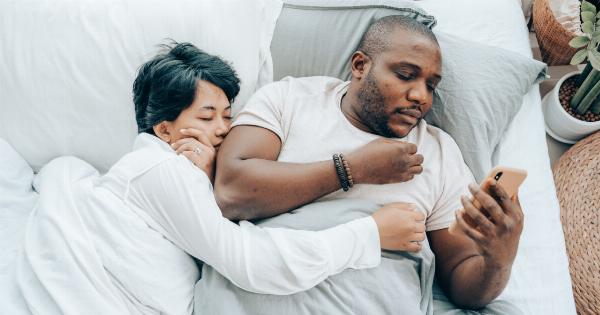In today’s digital age, smartphones have become an integral part of our lives. We rely on them for various tasks, from staying connected with friends and family to managing our schedules and accessing information.
However, the excessive use of smartphones, especially before bedtime, has raised concerns about its impact on our sleep quality and patterns. This article explores the relationship between phone usage and insomnia and provides tips on how to mitigate the potential negative effects.
The Link Between Phone Usage and Insomnia
Insomnia is a sleep disorder characterized by difficulty falling asleep, staying asleep, or experiencing non-restorative sleep.
While there can be various causes for insomnia, the use of smartphones before bed can significantly contribute to its development.
1. Blue Light Emission
Smartphones emit blue light, which can suppress the production of melatonin – a hormone that regulates sleep-wake cycles. When exposed to blue light, our brains interpret it as daytime, making it harder to fall asleep.
The constant use of phones in the evening can disrupt the natural sleep rhythms, leading to insomnia symptoms.
2. Mental Stimulation and Anxiety
Browsing social media, playing games, or watching videos on our phones can be mentally stimulating, making it difficult for our brains to wind down before sleep.
Engaging in activities that trigger excitement or anxiety can keep us awake, delaying the onset of sleep and exacerbating insomnia.
3. Disruption of Bedtime Routine
Many experts recommend establishing a consistent bedtime routine to signal to the brain that it’s time to sleep.
However, using smartphones before bed disrupts this routine, as we lose track of time and neglect crucial relaxation practices such as reading or taking a warm bath. This can lead to difficulties in falling asleep and maintaining a healthy sleep pattern.
4. Addiction and Dependency
Smartphones have become an addiction for many individuals, leading to excessive usage even during nighttime. Addiction to smartphones hinders the development of healthy sleeping habits, as users prioritize their phone over getting adequate rest.
This dependency can perpetuate insomnia symptoms and contribute to a vicious cycle.
5. Sleep Fragmentation and Disturbances
If smartphones are kept near us while we sleep, notifications, calls, or messages can disrupt our sleep periods, causing fragmented sleep.
Even if we don’t fully wake up, these interruptions can prevent us from reaching deep, restorative sleep stages, resulting in daytime drowsiness and reduced sleep quality.
Tips for Minimizing the Negative Effects
While it may be challenging to completely eliminate phone usage, especially in this digital era, there are strategies you can adopt to mitigate the potential negative effects on your sleep.
1. Establish a Digital Detox Before Bed
Set boundaries by creating a nightly digital detox routine. Aim to limit smartphone usage at least an hour before your intended sleep time.
Instead, engage in relaxing activities such as reading a book, meditating, or practicing gentle stretching exercises to prepare your mind and body for sleep.
2. Activate Blue Light Filters
Most smartphones offer blue light filters or night mode features. Enable these settings to reduce the impact of blue light emissions.
By filtering out the blue light, your phone’s screen will appear warmer and softer on the eyes, making it easier to fall asleep after phone usage.
3. Create a Charging Station Outside Your Bedroom
Keeping your phone on your nightstand may tempt you to check it during the night. Instead, designate a charging station outside your bedroom that is not within arm’s reach.
This simple change reduces the likelihood of disturbances and helps establish better sleep hygiene.
4. Establish a Consistent Sleep Schedule
Adopting a consistent sleep schedule strengthens your body’s internal clock, promoting better sleep. Try to go to bed and wake up at the same time each day, even on weekends.
This routine conditions your body to feel sleepy at the designated bedtime and enhances the quality of your sleep.
5. Create a Technology-Free Bedroom Environment
Make your bedroom a technology-free zone to mentally associate the space with relaxation and sleep. Remove all electronics, including TVs, laptops, and tablets, from your sleeping area.
Creating a tech-free environment can help reduce distractions and improve the overall sleep environment.
Conclusion
The excessive use of smartphones, particularly before bedtime, can disrupt sleep patterns and contribute to the development of insomnia.
The blue light emission, mental stimulation, disruption of bedtime routines, addiction and dependency, as well as sleep fragmentation caused by smartphone usage, all play a role in this phenomenon.
However, by implementing strategies such as establishing a digital detox, activating blue light filters, creating a charging station outside the bedroom, adopting a consistent sleep schedule, and creating a technology-free bedroom environment, you can minimize the negative effects of phones on your sleep.































